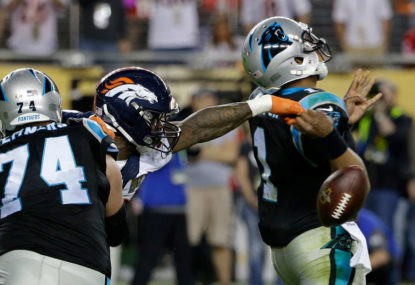From football hero to Hollywood star to infamous accused murderer: Muted tributes for OJ Simpson
The extraordinary episodes after his life as an American Football hero quite overshadowed the career of O.J. Simpson, who has died at the age…

On Tuesday night, the NFL announced its new broadcast partner for the hugely popular Thursday Night Football timeslot in 2016 would be social media site Twitter. Yep, you read that right.
Twitter beat out a range of other bidders (including Facebook and Amazon) and will begin live streaming Thursday evening games as soon as the American football season kicks off in September.
Overall, 10 of the 16 Thursday Night Football games across the season will be available via Twitter.
Wired called it a “modestly confounding move“. The Guardian said it “surprised the tech industry“. CNN called it a “potentially game-changing deal“, apparently unaware of the fact games were literally changing under the deal.
NFL commissioner Roger Goddell confirmed the move via a tweet – of course – also saying the NFL was looking to get in on the Twitter action, with everything but the game itself already on the social media platform.
This fall Thursday Night Football will be streamed live @twitter so fans will see more of this. https://t.co/s6tbr9FjvY
— Roger Goodell (@nflcommish) April 5, 2016
“Twitter is where live events unfold and is the right partner for the NFL as we take the latest step in serving fans around the world live NFL football. There is a massive amount of NFL-related conversation happening on Twitter during our games and tapping into that audience in addition to our viewers on broadcast and cable, will ensure Thursday night football is seen on an unprecedented number of platforms this season.”
Some analysts consider the move to be more of an experiment than anything else, particularly as the games will still be shown on their traditional network television channels.
Just to make that clear, the Twitter stream is therefore not exclusive and the games will still be distributed in their usual ways.
The NFL have suggested using Twitter was a way to attract younger fans, whereas Twitter have already indicated they are looking into increasing their level of advertising in relation to the games.
The outcome is probably less of a surprise when you consider who Twitter beat to get the rights. Twitter’s main rivals were not the big US TV networks, but were instead Facebook, Amazon and Verizon (a US telecommunications company).
Although the exact financial details of the deal haven’t been released, Wired reports Twitter actually paid less than the other bidders.
Indeed, Twitter apparently paid less for the ten-game rights than the $US20 million ($AU27million) Yahoo spent last year to stream just one game. Even worse for Yahoo, that game was the Jacksonville Jaguars versus the Buffalo Bills. (That joke might be lost on non-NFL fans, but it’s pretty much the same as this outdated one from The Simpsons – i.e. the Jaguars and Bills just aren’t very good).
It’s unlikely we will find anything else out about the exact amount Twitter paid for the rights or the quantum of the other bids, but the fact the NFL went with one of the lower bids indicates they are in a mood to experiment. It also indicates they aren’t short of a quid, with TV deals already bringing in around $US7billion ($AU9.27billion) per year.
It appears that Twitter is the ‘exclusive global partner’ which means Friday mornings in Australia might see more NFL than usual. And for the wider Australian market, it’s an intriguing deal.
Back in November, Australian telecommunications company Optus was announced as the new rights holder for the English Premier League, which thrilled some fans and perplexed others as the world’s most popular domestic football competition moved away from Foxtel for the first time in 18 years.
After five months of silence from Optus, late last month a partnership with SBS was announced, whereby SBS will air one free-to-air EPL match per week and Optus will broadcast the FIFA World Cup on its Fetch TV channel.
Some of the details are still sketchy, with with Optus paying somewhere between $15 and $20 million per season, you’d assume they will try and wring everything they can out of the investment.
What this means for the NFL and for sporting rights more broadly remains to be seen, but the introduction of new players in the market was something forecast by former NRL CEO Dave Smith as part of the recently concluded NRL rights negotiations. The NRL eventually received around $2 billion for their TV rights deal, which relied heavily on traditional distribution channels such as free and pay TV.
The NRL and the AFL recently announced all games would be streamed free online for Telstra customers via the NRL Digital Pass and the AFL Live Pass respectively.
While we might not be gathered around our smartphones on Twitter watching State of Origin just yet, it’s still exciting times for the entertainment and sports industries.
Article first published on Techly.